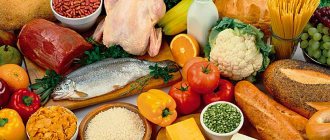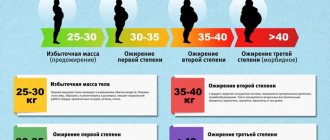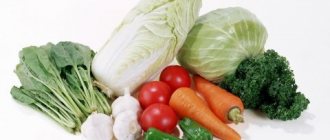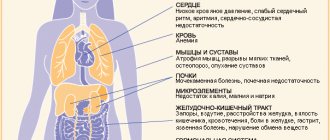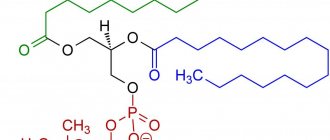Many people, hearing the word “cholesterol,” panic, considering it a very dangerous and harmful substance. If you believe the advertising, then this organic compound enters the body exclusively with food, but this is not at all true. Elevated blood cholesterol levels can result from concomitant diseases and malfunction of internal organs.
To lower cholesterol correctly, it is important to distinguish a bad compound from a good one and know about the principles of restoring vascular health. Today we will talk about methods on how to improve your well-being at home using traditional methods, diet, lifestyle changes and taking medications prescribed by the doctor.
Why is lowering cholesterol so important?
High cholesterol - what does it mean, and is this condition really dangerous? This organic compound is a naturally occurring fatty alcohol (lipid). It is found in cell membranes in most living organisms on earth.
Many people believe that cholesterol comes only from the outside through food, but this is not entirely true. Only 20% of the substance saturates our body, the rest is produced by liver cells. When cholesterol levels are normal, the body can function fully - the substance promotes the proper production of hormones, the absorption of vitamins, and maintains a healthy immune system and nervous system.
So why do most people think that cholesterol is only harmful? To ensure a high-quality supply of blood to organs, special transporter proteins are needed - cholesterol combines with them, since they are soluble in water, unlike this compound. But lipoproteins are already divided into two types.
“Bad” lipoproteins have low density, cannot dissolve in water and deposit sediment on the walls of blood vessels in the form of cholesterol crystals. It is due to the fault of such lipoproteins that atherosclerotic plaques accumulate in the vessels. “Good” transporter proteins have a high density, which allows cholesterol to be absorbed and not deposited inside the capillary network.
So, in order to lower cholesterol in the blood, you need to reduce the amount of low-density lipoproteins, replacing them with “good”, dense ones. Why lowering high cholesterol to normal is important, and how a change for the better will affect your health:
- weight loss due to dieting;
- the vessels will become less brittle, more elastic, and their tone will increase;
- lowering blood cholesterol levels is the main prevention of atherosclerosis;
- the body will be able to fully receive vitamins and minerals;
- the functioning of the digestive, nervous and immune systems will improve.
To remove excess “bad” cholesterol from the body, it is important to focus on an integrated approach. Taking medications or following a diet alone is not enough. It is important to change your lifestyle, eat a balanced diet, get proper rest, and provide your body with regular physical activity.
Diet to normalize cholesterol levels
If the level of bad cholesterol in the blood of an adult is not elevated to critical levels, then the problem can be dealt with at home by starting to eat right and studying the principles of dieting. It is important to learn not only which foods to include in your main diet, but also which ones you should completely avoid.
After all, a positive effect will not be achieved if you consume cholesterol-burning foods along with unhealthy dishes. Reducing the volume of harmful lipoproteins in the blood is based on avoiding animal fats contained in the following products:
- meat, fish, fatty poultry;
- offal;
- rich broths based on fatty meat;
- ready-made sauces and dressings for dishes, including ketchup and mayonnaise;
- light chocolate, cocoa, strong ground coffee;
- baked goods, butter bread, buns, sweets and other confectionery products;
- dairy products with a high percentage of fat.
An important point is the method of cooking. To reduce the intake of harmful fats into the body, foods should not be fried in oil; it is better to stew, boil or steam them.
Fractional meals are the best way to ensure a feeling of fullness for the whole day, without overloading the stomach and normalizing the level of lipoproteins in the blood. You should eat 4 to 6 times a day, being sure to follow the drinking regime (drink at least 2 liters of purified water per day).
Cholesterol-lowering foods
It is necessary to combat harmful organic compounds with the help of diet correctly so that healthy products fully fulfill their function. For example, a garlic tincture that is mixed with alcohol or olive oil and then used as a seasoning for food or drunk drops may be harmful to people with gastrointestinal diseases. Therefore, before starting self-treatment, you should visit a specialist to make sure there are no allergies, contraindications or other dangers.
Phytosterols
The fight against cholesterol is effective when consuming phytosterols - these are plant styrenes that help increase the density of lipoproteins in the blood, turning them from harmful to beneficial for the body. There are many dietary supplements containing phytosterols, but you can eat half an avocado daily to achieve therapeutic benefits.
Conducted studies have proven that people who were on a low-fat diet for a month and consumed ½-1 avocado per day reduced their cholesterol by 8-13%. List of foods high in phytosterols:
- pine and almond nuts;
- sprouted wheat;
- pumpkin seeds;
- Olive oil extracted by cold pressing;
- bran;
- sesame;
- pistachios.
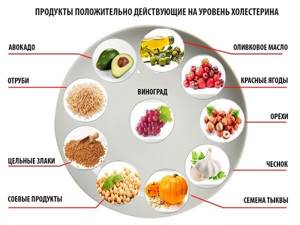
Many consider olive oil to be healthy and 100% safe, not knowing that only a cold-pressed product helps cleanse blood vessels of cholesterol plaques. Whereas replacing it with cheap options will not give any therapeutic effect.
Cellulose
If cholesterol has increased, doctors consider fiber a magic product for returning indicators to normal. Fiber-rich foods:
- oatmeal (from fresh cereal, not instant from a bag);
- cereals (barley, buckwheat, rice, millet);
- legumes (especially soybeans and lentils);
- flax-seed;
- fresh or pickled white cabbage;
- bran.
The large amount of fiber contained in bran allows you to qualitatively cleanse the body of toxins and harmful substances, regulate the amount of cholesterol in the blood, and improve digestion. You can add this healthy product to cereals, yoghurts, and wash down the bran with kefir.
Polyphenols
This is the name of the substances that promote the conversion of low-density lipoproteins into high-density lipoproteins that are beneficial to the body. What polyphenols contain:
- olive oil;
- chokeberry;
- pomegranate;
- red and dark grapes;
- cowberry;
- strawberries;
- blueberry.
Daily consumption of the listed products for two months can remove excess cholesterol, reducing the level by 5-10%. You can make fruit drinks from the berries and combine them with kefir and yogurt. It is advisable to eat dark grape varieties with their skins and seeds; they contain the largest amount of polyphenols.
Fish fat
When treating high cholesterol with medications, doctors always prescribe statins - these are drugs that reduce the production of their own organic matter by liver cells. But fish oil is considered the best natural statin; it regulates the production of cholesterol in the body, adjusts the balance between harmful and beneficial substances by converting low-density lipoproteins into high-density ones.
It is not necessary to drink fish oil purchased at the pharmacy. You can cook fish yourself by boiling, stewing or steaming (but not by frying in oil).
Vitamin D
Vitamin D is also a cholesterol-lowering substance – it is produced in the body independently during exposure to the sun. The element helps to increase the density of lipoproteins, but if you lack your own vitamin D, you need to get it in the form of pharmaceutical formulations.
When choosing a suitable drug, you should rely on the opinion of a doctor, who will take into account individual intolerance, concomitant diseases of the liver, thyroid gland, and kidneys. A lot of the vitamin is found in meat, eggs, mushrooms and hard cheeses, but when following an anti-cholesterol diet, most of these products are limited.
Magnesium
Cholesterol itself is not dangerous and does not begin to accumulate in the form of plaques on the walls of blood vessels as long as the capillaries have the ability to repel lipids. But with a lack of magnesium, the arteries become fragile and brittle, harmful lipoproteins penetrate microscopic damage, eventually forming atherosclerotic plaques.
In order to get rid of such accumulations in time and bring the blood vessels to their original tone, the magnesium balance should be restored. This important element is contained in sauerkraut and fresh cabbage, bananas, seeds, legumes, baked potatoes, sprouted wheat, soybeans and legumes.
Garlic
One slice of root vegetable contains a lot of natural substances that are similar in action to statins. If you want to normalize blood cholesterol levels and there are no contraindications, a person should consume at least 2-3 cloves of garlic daily. It is advisable to eat the product fresh, using it as a dressing for vegetables, main courses (after cooking) and salads.
Why high cholesterol is dangerous for women
High cholesterol appears when metabolism and lipid metabolism fail. Excess low-density lipoprotein - LDL accumulates inside the vessels, settling on the walls, forming atherosclerotic plaques. The process progresses quickly if the arteries are inflamed. Atherosclerosis begins.
In women after fifty years of age, atherosclerotic damage to the arteries leads to their narrowing, and the blood supply to tissues and organs decreases. More serious complications appear:
- Ischemia of internal organs. Most often, coronary heart disease develops. Appears due to narrowing of the coronary arteries when the heart muscle lacks oxygen. IHD can occur acutely (myocardial infarction, cardiac arrest) or chronically (angina pectoris).
- Infarction of internal organs. Due to insufficient blood supply, tissue necrosis begins, which can affect any active organ: the brain, heart, muscles of the limbs, kidneys, spleen.
- Brain stroke. It develops against the background of partial or complete blockage of blood vessels, leading to prolonged oxygen starvation of tissues. More dangerous is a hemorrhagic stroke, which occurs when a vessel ruptures, with hemorrhage in the brain.
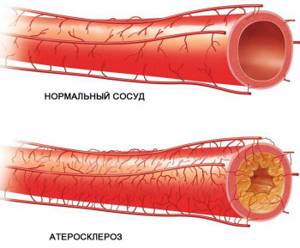
The formation of cholesterol plaques can occur in any arteries. As statistics show, the coronary arteries (heart), carotid (brain), vertebral (lower limbs), and renal arteries are most often affected.
An unhealthy diet and constant stress contribute to high cholesterol. The main risk factor found in women after 50-60 years of age is obesity.
Lifestyle changes and exercise
To cure high cholesterol, a comprehensive approach is needed. At the same time as following the diet, it is necessary to get rid of addictions - smoking and the habit of drinking alcohol. If the body regularly receives nicotine, the carcinogens, tars and mutagens contained in cigarettes have the most negative effect on blood vessels. They become fragile, lose elasticity, and their ability to absorb harmful lipids increases, from which atherosclerotic plaques form over time.
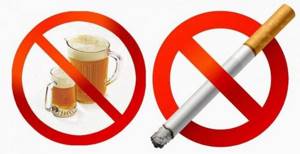
Quitting bad habits is very important to combat high cholesterol levels.
Alcohol is an equally dangerous product. The effect of ethyl alcohol on the body is akin to permanent poisoning, and if the alcohol product is not of high quality, but contains methyl alcohol (a cheap substitute for natural alcohol), then it becomes life-threatening.
Constantly narrowed vessels do not cope with their task, become overgrown with bad lipids, become clogged, and cannot supply blood to internal organs and the brain. And this is a direct path to the advanced stage of atherosclerosis. Along with giving up bad habits, it is necessary to provide the body with regular physical activity, be it sports games, therapeutic exercises, walking, running, swimming or just walking in the evenings in the fresh air.
Physical activity leads to weight loss, which is important for obese people (they often have high blood cholesterol), improves the functioning of the stomach and intestines, and promotes the outflow of bile. Jogging and race walking are especially useful; during exercise, the respiratory system is strengthened, the functioning of the heart and blood vessels is improved, and harmful impurities are independently removed from the blood.
Table of prohibited products
Prohibited foods that should not be included in the diet if you have high cholesterol are presented in the table:
| Fruits and dried fruits |
|
| Cereals |
|
| Bakery products |
|
| Confectionery |
|
| Sauces and seasonings |
|
| Dairy and fermented milk products |
|
| Meat products |
|
| Sausages |
|
| Fish and seafood |
|
| Oils and fats |
|
| Beverages |
|
Ice cream and cholesterol are closely related to each other, since such a product is prepared from milk, which contains this organic compound. People with atherosclerosis are advised to abandon this delicacy or reduce its consumption to a minimum.

Traditional methods of treatment
It will be difficult to quickly lower cholesterol levels only with the help of traditional methods if you do not follow a diet, continue to drink and smoke, and spend most of the day on the couch. But with an integrated approach, recipes from the folk piggy bank can be a good help in combating the problem:
- dandelion root - a powder is prepared from dried raw materials, then a teaspoon is consumed before each meal during the day. A course of six months is enough to feel improvement;
- propolis tincture – 4% composition helps to cleanse blood vessels and reduce blood cholesterol levels if you mix 7 drops of tincture with a glass of water and drink half an hour before meals;
- licorice root - many people know this ingredient as being present in cough recipes. In this case, a two-month course of treatment will help get rid of excess cholesterol. 2 tablespoons of raw material are crushed and boiled for 10 minutes in 500 ml of water, then drunk in a course of 2-3 weeks, a third of a glass three times a day. After a month of break, the course is repeated;
- white cinquefoil root - cut it into pieces, pour 50 g. raw materials with two glasses of vodka and leave in a dark place for two weeks, shaking constantly. You should drink 25 drops before meals for 30 days. After a ten-day break, if the infusion is over, you need to add another glass of vodka, but take 25 drops over the next 14 days;
- tincture of hawthorn flowers - 4 tablespoons of flowers are poured with a glass of alcohol and infused for 10 days. The finished composition is consumed first by 5 drops, increasing the dose by 5 drops daily. When it reaches 100, you need to drink the infusion in the reverse order, gradually reaching the original five drops.
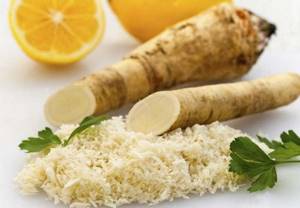
A mixture of lemons, horseradish root and garlic is good for removing high cholesterol.
You need to take 250 grams. lemon, garlic and horseradish root, grind everything in a meat grinder (lemons with skin), pour a glass of cool water and leave overnight to infuse. Take the prepared mixture one tablespoon at a time, with a small amount of honey, three times a day before eating. This recipe is not suitable for people suffering from stomach and intestinal diseases.
Taking medications
Drug treatment of high cholesterol is required in cases where the indicators are very high, and atherosclerotic plaques have already begun to be deposited in the vascular cavities. It is necessary to undergo treatment under strict medical supervision, in no case prescribing medications yourself - each of them has side effects.
Groups of drugs used to reduce levels of bad cholesterol in the blood:
How to lower cholesterol without statins?
- nicotinic acid – helps to increase the volume of high-density lipoproteins in the blood, while simultaneously reducing cholesterol levels;
- fibrates – reduce the production of their own harmful fats by liver cells;
- bile acid sequestrants – bind and remove harmful fatty acids from intestinal tissues, preventing them from damaging the walls of blood vessels throughout the body;
- Statins are a group of drugs that are most often prescribed for cholesterol problems. It is better to take them at night, since during sleep the production of the body’s own organic compound increases.
At the same time, the patient may be recommended vitamins, complexes with double the content of rutin and ascorbic acid. If there is a lack of vitamin D, magnesium and potassium in the body, a specialist will prescribe medications that replenish the supply of these substances valuable for the heart and blood vessels.
Table of permitted products
If you have hypercholesterolemia, you need to eat foods that lower blood cholesterol. Along with medications, they help achieve good results and normalize this indicator. The list of products is presented in the table:
| Vegetables and greens |
|
| Fruits |
|
| Berries |
|
| Nuts and dried fruits |
|
| Cereals and eggs |
|
| Raw materials and seasonings |
|
| Dairy and fermented milk products |
|
| Meat |
|
| Fish |
|
| Oils and fats |
|
| Beverages |
|
Dairy products are allowed on a low-cholesterol diet, but cholesterol is present in milk. Therefore, you need to choose a product with reduced fat content.

Useful tips
Treating cholesterol isn't just about taking pills. You can reduce the levels of harmful substances in the blood yourself, with the help of simple tips. Avoid strong ground coffee. Scientists have proven in recent tests that in the process of repeated boiling of ground coffee beans, a large amount of cafestol is released from them. This substance contributes to increased cholesterol in the blood, the development of arterial hypertension and atherosclerosis.
Carefully read the labels in the store. Even if some ready-made sauce seems harmless and will improve the taste of the prepared dish, the animal fats present in the composition will be deposited on the walls of the vessels. Therefore, when purchasing, you should choose products without GMOs, cholesterol and preservatives.
Do a warm-up for 30 minutes a day. If you constantly don’t have enough time to go to the gym, doctors advise devoting time to sports even while at work. Several approaches of walking (2-3 for 10 minutes) will bring good results in the fight against cholesterol.
Try to eat only at home and only healthy food. It's no secret that cooks in canteens and cafes often fry meat in the same oil, trying to save money, stew stale vegetables, and add flour to the frying for first courses. If you have to dine in a cafe, it is better to order a light salad with fish or vegetables and not season your food with ready-made sauce.
Avoid hypothermia. For many people, freezing weather releases large amounts of nitric oxide into the blood, and this substance can be harmful. Under its influence, blood vessels narrow, blood pressure and cholesterol levels rise. To avoid problems, you should walk briskly in the cold - this will get your blood flowing, your blood pressure will drop, and your cholesterol will not rise.
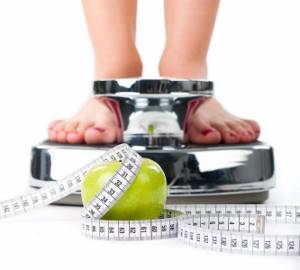
It is important to keep your body weight under control. If you have an extra 500 grams of weight, the level of cholesterol in the blood jumps by 2 levels - this was the conclusion made by Dutch scientists during research
To control cholesterol levels, experts recommend donating blood for a detailed analysis at least once every six months. Since organic matter can be harmful and beneficial, only a detailed interpretation of laboratory tests will allow us to assess the health status of a particular patient.
Summing up
Increasing cholesterol is a process that is not always noticeable even to the person himself. At first, you are worried about excessive fatigue, memory impairment, and the inability to spend a long time in physical stress. As plaques form on the walls of the capillaries, headaches, chronic fatigue, sleep disturbances and pressure surges occur.
You need to start getting rid of such symptoms immediately and using an integrated approach. It is recommended to immediately visit a specialist, donate blood for a detailed analysis, and then follow the doctor’s advice, follow a diet, give up bad habits and take prescribed medications.
Symptoms of high blood cholesterol
In the initial stages of this process, it is usually very difficult to feel any negative changes. Many people find out about the problem only after a heart attack or diagnosis. That's why it's so important to monitor your health and get blood tests regularly.
However, there are the first signs of high cholesterol, to which a person does not always pay due attention. These include:
- discomfort in the heart area,
- hypertension,
- weakness and pain in the lower extremities,
- memory impairment,
- fatigue,
- stomach upset.

